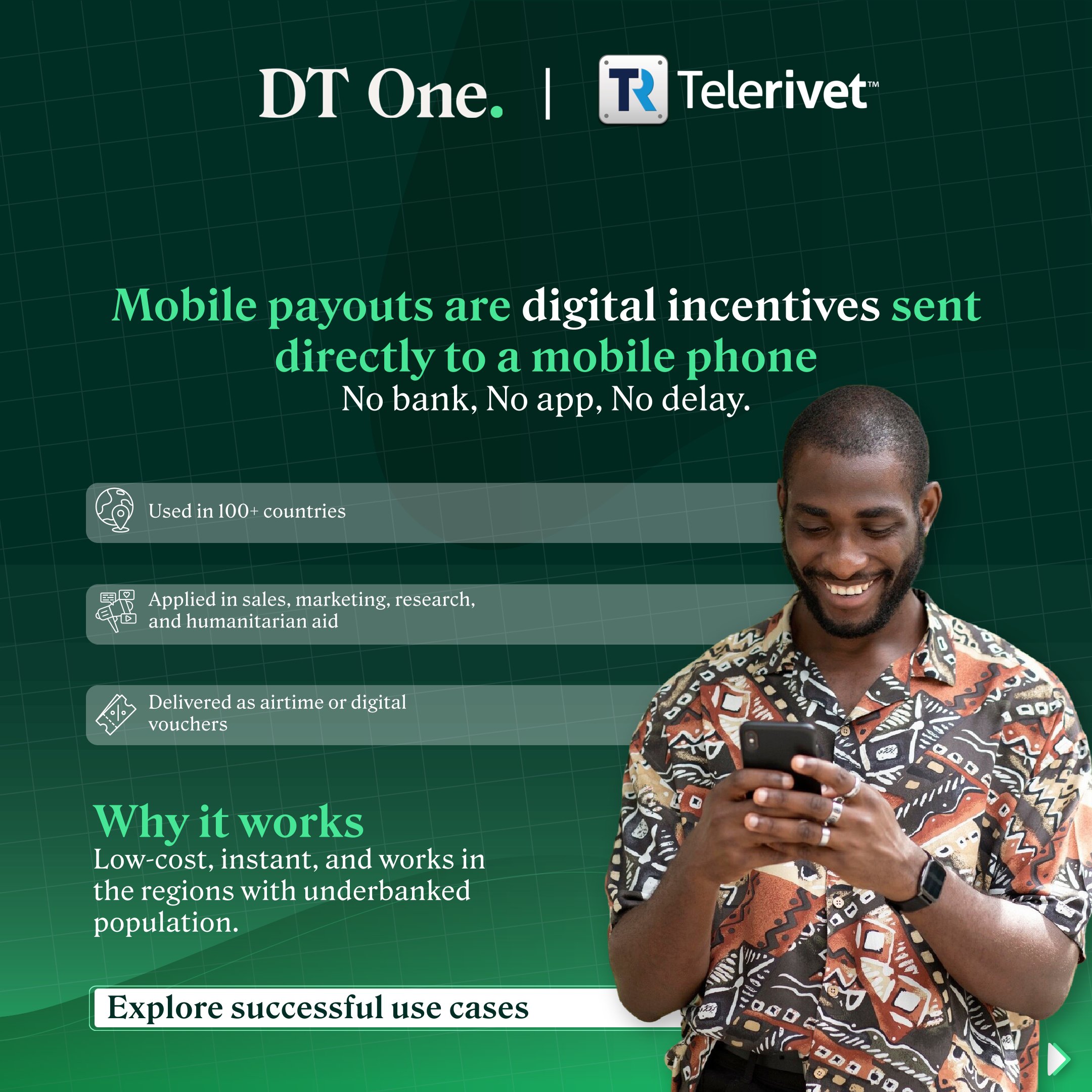In this guide, we explore practical use cases:
- What are mobile rewards?
- Motivate sales reps in the field
- Run loyalty campaigns to reward your best customers
- Increase participation in a study or research
What are mobile rewards?
If you're a longtime DT One customer or reader, then you're probably familiar with mobile rewards.
But if this article has been shared with you - or you've arrived from Google - you might have some questions about what mobile rewards really means.
In short, mobile rewards are benefits sent to mobile phone users through easily accessible means that companies or organizations can use to either reward users or to incentivize other activities.
Some rewards might exist in the form of a voucher - a digital voucher that can be redeemed for a discount or even a whole product, in a particular location or business.
Other types of mobile rewards might be SMS tokens, which in certain geographies can be used to redeem cash at a bank.
This is a simple and low-cost way of delivering a cash transfer across the world.
It’s particularly effective in countries that don’t have state-of-the-art digital currency infrastructures.
Or, mobile rewards might come in the form of sending airtime - one of the most popular methods of delivering mobile rewards.
Airtime transfers are particularly useful in Southeast Asia, Latin America, and parts of Eastern Europe and the Middle East - where mobile phone users need to top up their phone’s credit balance as they use it.
In those geographies, an organization or business can top up a customer’s balance for them, effectively delivering a cash transfer to that individual.
This is a really simple way of delivering rewards, and it’s incredibly popular in some of the world’s most dynamic emerging economies.
Motivate sales reps in the field
The first use case we'll touch on for mobile rewards leverages airtime transfers.
One benefit of airtime transfers is that they can be set up as an automated system - with automated triggers, so that rewards can be distributed in real time as a result of a preceding action.
One use case we've seen at Telerivet that's been very effective is utilizing airtime transfer as a reward for sales reps on the ground, when they’re doing field work.
One company had sales reps running a stall in a major city in Southeast Asia.
The reps were attempting to engage passersby and sell them on the company’s range of products.
With each successful sale, the sales rep received mobile rewards instantly, along with a notification to let them know it had come through.
This didn’t function as the primary payment method for the sales reps - but rather as an immediate bonus system, to incentivize and motivate them in the field as they moved from one prospect to the next.
This approach proved very effective, and led to increased sales in the locations where it was deployed.
The same principles can be applied to any kind of field work, to incentivize either the employee, or to offer a real-time bonus to the new customer.
The delivery of mobile rewards is flexible - and very effective on the go.
Run loyalty campaigns to reward your best customers
The second use case for mobile rewards is to give them directly to your customers.
There are many companies that attempt to develop their own applications and create user management systems - all in the hopes that a customer can become more highly engaged, and access deals and vouchers within the app in order to buy more products and retain that customer for longer.
By leveraging mobile rewards - either through airtime or through a voucher system - you can gain many of the same benefits that might be accessed through an app, but without having to go to the same levels of expense, or take the time required to build out that infrastructure.
Utilizing mobile rewards - and sending, for example, a digital voucher to customers via SMS - allows customers to:
- Be reminded of your products and services
- Receive a discount on those products and services
- Be rewarded for participating in polls or feedback
- And easily present the voucher in a verifiable and secure way to redeem the benefits
This is a lightweight solution to a universal business problem - and it’s a tried and tested channel for increasing engagement, conversions, and sales.
Why not check out DT One’s offerings for digital vouchers, to see if there’s a solution that fits your needs?
Increase participation in a study or research
The third mobile reward use case is for research and completing studies.
This is a use case that applies to businesses, charities, governments, and other organizations.
At Telerivet, we see this use case incredibly often.
We’ve seen it used by private businesses looking for extended customer feedback.
And we’ve seen it used by charities attempting to find the most effective way for them to deliver successfully - to maximize their impact.
Another area where we’ve seen this used in larger numbers is in the humanitarian space, particularly around impact assessments and fundraising enablement.
It’s increasingly common that fundraising efforts need to be supported and augmented by data illustrations of impact.
And this kind of outreach - simple and easy - is crucial to generating that data and securing future funding.
Rewards can be issued at the initiation of a study, and again upon completion of the study, with companies having the flexibility to structure their incentives in a way that makes the most sense for the outcomes they are trying to achieve.




